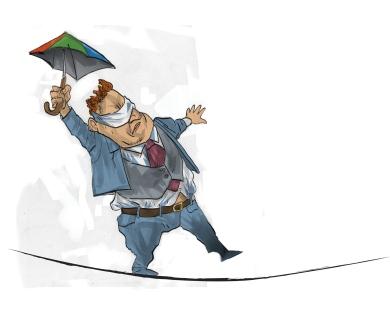Historic Supreme Court judgment concerning bank products
Norway's Supreme Court is now considering the Røeggen case, one of two related judgments from the Court of Appeal in which DNB and Fokus Bank were acquitted of being in breach of good business practice. A few thousand small savers and a number of big investors are awaiting the judgment. Professor Thore Johnsen has served as an expert witness in both cases.
05.11.2012 - Text: Sigrid Folkestad Photos: Siv Dolmen/Helge Skodvin
The two cases that are being considered by the Supreme Court are both about rules for good business practice and what constitutes sufficient information from sellers of financial products.
DNB and Fokus Bank
The Røeggen case started in the Supreme Court on Tuesday 23 October. 'The validity of agreements for so-called structured savings products' is the title of the hearing on the validity of agreements between DNB and Ivar P Røeggen for investments in two equity index-linked bonds. Four days were set aside for the case.
The case against Fokus Bank (a branch of the Danske Bank Group) concerns a claim for cancellation and compensation after the purchase of a financial product. The case begun on 1 November 2012, and five days were set aside for it.
The cases against Fokus Bank and DNB will be considered jointly by the Supreme Court.
Invested borrowed money
In 2000, Ivar Petter Røeggen invested NOK 500,000 in two savings products that were debt financed, but when the lock-in period had expired six years later, he had lost NOK 230,000 in interest and charges. The investment was financed by a fixed-interest loan at approximately 8% interest.
Røeggen took DNB to court with the support of the Norwegian Consumer Council, claiming that the bank should pay the costs. Oslo District Court found in favour of Røeggen, but he lost the second round in the Court of Appeal.
Around 2,000 complaints against bank products are currently filed with the Norwegian Financial Services Complaints Board. The outcome of the case in the Supreme Court concerns a very important matter of principle, and, if the court finds in favour of Røeggen, it could mean that customers will be awarded millions in compensation.
The most important aspect of the Røeggen case

Professor Thore Johnsen.
Foto: Helge Skodvin
In 2008, Thore Johnsen submitted an expert report on behalf of the Complaints Board for Consumers in Banking, Finance and Mutual Fund Matters (now the Norwegian Financial Services Complaints Board). DNB contested the original expert report, and Johnsen wrote a new report in which he commented on the bank's objections. This report was also extensive.
'Then the bank raised new objections, but at that time, we were cooperating behind the scenes. This was done openly. I wrote about it, and the bank wrote about it.'
'The principles involved were one thing,' says Johnsen, 'but the actual facts of the case were something else entirely, and had to do with calculations. What was the expected return? What was the risk?'
'That involves calculations. It is important that you use the same models for calculations, or that you agree to disagree, but in such case, this must be clearly stated. Or you'll never reach agreement.'
It became clear at a relatively early point that Thore Johnsen and DNB should exchange models. The result was that Johnsen's model was used. It thus immediately became clear what the source of the disagreement was.
'Which brings us to the most important aspect of the Røeggen case, in my opinion. Because the customers aren't professionals - you need to really know what you are doing to understand what this complex product involves - it is easy to include costs without the customers noticing. That is precisely what DNB did.'
Debt-financing
The finance professor's point is that the costs associated with the product were far too high, especially if the investment was debt-financed. At the same time, the debt-financing made the product too risky for ordinary customers.
'I concluded that I thought that it was irresponsible of the bank, or of DNB Markets, which marketed the product for the bank, to push debt-financing of a product like this. If the bank's board of directors had understood this, they would have stopped it sooner,' Johnsen believes.
He also believes that many DNB employees developed a disliking for the product when they realised what it entailed.
'But they thought it was nice to make money, and it was very profitable for the bank.'

Illustrastion: Willy Skramstad
Beyond the bounds of common sense
Could the product have been acceptable if it hadn't been marketed to small savers?
'Well, the "Røeggen product" was introduced relatively early, in 2000. It was an early version of similar products, and they were beyond all common sense. They were junk, to put it simply. It was neither saving nor speculation. It was trickery, and the costs were high. But, in principle, this early product was simple and clear-cut. If it hadn't been for the costs, it would have been a good product.'
In your opinion, what responsibility do Røeggen and the other customers who purchased these products at an early stage have?
'I don't want to go too far in releasing customers from their responsibility for familiarising themselves with what is involved. If you don't understand a bank product, you should stay away. The bank shouldn't have to tell you that, you should know that yourself. Former Minister of Finance Kristin Halvorsen put it very aptly: "You mustn't mistake a banker for your grandmother." That's not his job. He's a salesman.'
Thore Johnsen draws a parallel with Sweden, where the same products were introduced, but earlier.
'They were just as popular, but there are no court cases there.'
Why not?
'Swedish customers are traditionally more critical. It's the same in asset management. Norwegian customers accept 2% in costs for an extremely simple unit trust which should really only cost 1%. They don't even ask. Norwegian customers are very careful when it comes to electricity and shop around for the best price. And as for buying a car? They keep at it for years. It's the same for flat screen TVs and PCs. But making a million kroner investment? Then, they just ask: "Is this good?" "Sure," says the bank. "Then I'm all in!" The Swedes are far more critical. They have more experience of the financial sector and are better at assessing the advantages and disadvantages,' says Johnsen.
This is still the case in the Norwegian financial market, he believes. 'Norway was relatively late to modernise its financial market. To put it bluntly, part of the reason is that Norwegian customers are far too naive and accept almost anything,' Johnsen says.
The Røeggen product is not all bad
'I don't entirely agree with those who claim that it is just junk. The problem is that the bank got too greedy. They took out too much and were a bit unfortunate because the cost of the loan proved to be higher than they had actually envisaged.'
The professor says that DNB could have chosen to change its mind or compensate customers, but chose not to.
'That is why they can't just claim afterwards that they were simply unlucky because they locked the interest rate on the loans early, before the customers bought into the product,' says Johnsen.
What interests you most about your role as an expert witness, the academic aspects or the principles involved?
'I must say that I am a bit annoyed that the bank allowed unsuspecting amateur customers to agree to debt-financing. That was unfortunate. The bank is to blame for that, of course, but the problem is also that the customers don't shop around.'

Norway's Supreme Court.
Foto: Siv Dolmen
The Fokus Bank case
Professor of Finance Thore Johnsen at NHH is also an expert witness in the Supreme Court case in which 29 plaintiffs are suing Focus Bank after investing in savings products that did not yield the expected return. A number of limited liability companies, associations and private individuals are among the plaintiffs.
NTNU Social Research, in particular, has had a lot of press coverage following its ill-fated transaction with Fokus Bank.
The case against Fokus Bank involves much bigger investments in structured credit products, and it is more complicated, Johnsen believes. Basically, he explains, this is the same type of product as Røeggen's DNB product, but understanding credit risk is something even professional investors are unfamiliar with.
'There are several professional investors involved in the action against Fokus Bank, including a former chair of the board of Fokus. He is one of the people who have taken the bank to court.'
The District Court found in favour of the plaintiffs
A unanimous judgement was handed down in the District Court in favour of 12 of 29 investors, including non-profit organisations, research institutions and private individuals. They did not have to meet their commitments provided that they had lodged a complaint before a certain date. The professional investors were not awarded compensation with reference to their being experienced investors.
'In Oslo District Court, the judgement against Fokus Bank was based on matters of principle, and the grounds for it were very well set out by the lay assessors, including Tore Lindholt, the former CEO of Folketrygdfondet. Later, however, the Court of Appeal said that no one, regardless of how stupid you are and almost regardless of how little information the bank has given you, can be released from their responsibility for following up their own investments. The District Court said that, if you're an amateur, the liability and responsibility rests with those who should have understood the matter. The bank, in other words.'
As in the Røeggen case, the Court of Appeal went in the opposite direction.
'No matter how stupid you are to have let yourself be tricked by the bank, you have to pay,' said the Court of Appeal.
'The Court of Appeal made a very narrow assessment in the Røeggen case. It was probably not as evident as the District Court claimed, that Røeggen was right and the bank wrong, but, in the end, the District Court's conclusions were correct. They gave very careful consideration to several factors.'
'The Fokus case, in particular, shows how important it is to make a nuanced and thorough assessment,' Johnsen believes, 'and that didn't happen in the Court of Appeal's consideration of the Focus case.'
Pay up - no matter what
'It has to do with principles. I think it was the writer Arne Garborg who said: "Those who do not open their eyes, must open their pockets." And isn't that true? If you don't keep your eyes open, you'll have to pay. That was the principle that the Court of Appeal chose to apply. Regardless of your background or whether you're an amateur, and regardless of what the bank did - you had an independent responsibility and should have checked your purchase. You can't claim that you didn't understand it afterwards just because you failed to do so.'
What conclusion do you think the Supreme Court will arrive at?
'I'm interested in the Supreme Court's judgment, of course. I hope it will be a reasonable judgment, or, in solomonic terms, a wise one.'
'The Supreme Court has to consider the application of the law, not the realities behind whether a negative return was expected or not. That is why it's difficult to predict the outcome,' he says.
Have any of your students been involved in designing these products?
'Yes, several of them have been involved in these products. But as I said, several of the early products were good. Too high costs were included, but the construction itself could actually have been of benefit to customers. But since it was designed the way it was, it didn't work,' Johnsen concludes.
The article was originally published in NHH's reseasrch magazine, NHH Bulletin no. 3, 2012.
|

